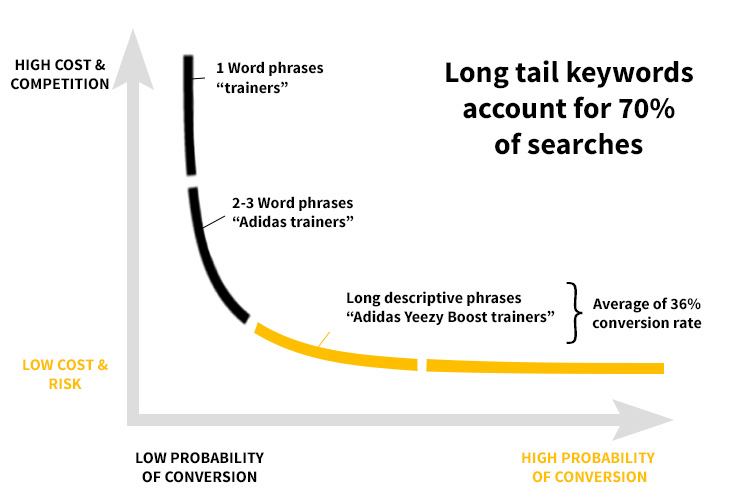Keywords were, and still are, the building blocks of almost any SEO strategy. As points of reference, they can help us hone in on what exactly people are looking for and target their search attempts. It informs everything from our content to link building campaigns.
However, as consumers and search engines are getting smarter, we have to get smarter about keywords too. We have to start researching and using keywords more conscientiously. Whether you’re new to SEO or you feel you need to reassess, taking some time to come up with a new keyword strategy will help your chances of success.
No, you’re not going to conquer Google SERPs for your niche within two weeks. However, by taking two weeks to reassess and come up with a plan of attack, you can lay the groundwork to do so in the future.
Day 1: Establish your goals
To maximize the effectiveness of your SEO strategy, it’s crucial to keep your goals in mind from the beginning, ensuring that your keywords are aligned with these objectives. Where in the user journey do you want to target search terms? What action do you want people that click on your SERP results to take?
The answers to these questions should inform your keyword research. For example, if you run a store, you might want to target users using “buy”, “purchase”, or even “price” in their queries. This kind of direct correlation will also allow you to track the results of your SEO keywords.
Even Google believes that “consumer intent is more important than demographics.” Understanding what consumers want and where, why, and when they want it is key to effective keyword usage.
Day 2-4: Do your initial keyword research
Armed with your goals, you can now start researching keywords to target. Keyword research is another topic that can take a whole book to explain. For your initial research, you can just fire up Google Keywords Planner and start playing around. However, you’ll want to think carefully about the following:
- High search volume keywords are the first things most marketers target. Even though they have a lot of traffic, you will also face a lot of competition ranking for them.
- Both short and long tail SEO keywords have their place. Short tail keywords have a wider net to attract search engine users, while long tail keywords carry more intent.
Find keywords with user intent that matches your goals, a decent amount of search volume, and bearable competition and you’ve struck gold. Although the focus used to be more on short-tail keywords, long-tail keywords are searched more and have a higher probability of conversion:

A keyword planner is also not the only way that you can research keywords. Looking at your competitors is another, possibly even richer, source of data. See what keywords your competitors rank for and what is effective and what isn’t.
Understanding what exactly your competitors are ranking for can also give you an insight into what you can do to differentiate yourself. This is also where long-tail keywords can be useful. Finding your niche within your niche will help target your future keyword endeavors.
Day 5-7: Draft a keyword optimization policy
To ensure best keyword practices and standards are always maintained, you need to come up with a policy or set of guidelines. This will help everyone stay on the same page; from your editors to content writers to keyword researchers.
SEO marketers all have different ideas about how to use keywords in a piece of content. It’s up to you to come up with a policy that works for you. Amongst others, you’ll want to specify:
- How many times to use a keyword
- How many variations to use
- Where the keywords should be positioned
- How to use them in relation to links (backlinks on guest posts)
- When and how to use keywords in titles, tags, etc.
If you use WordPress, tools like Yoast SEO and Rank Math SEO can already do much of the thinking for you. However, even then, a policy can help editors quickly check that a text is up to scratch. A policy like this will also help you track how your results change as you try new keyword techniques.
Day 8-10: Integrate a link building and guest posting strategy
Inbound links are still one of the top 3 SEO ranking factors. Apart from SERPs, link building will help you grow organic traffic in many other ways. For that reason, link building should be one of the main drivers of your keyword research efforts.
Guest posting is one of the best mediums through which to build backlinks. Consumers prefer to read about brands rather than see ads. Furthermore, it’s a great way to expand your readership and to establish your brand and voice as an active and respected part of whatever industry you’re in.
You shouldn’t consider backlinks and guest posts as an isolated part of your marketing campaign. Instead, think of how you can use keywords on your site and external sites together to your advantage. In different situations and on different sites, you might need to adjust your keywords to be more relevant and effective.
If you don’t have the resources for an intensive guest posting campaign, a guest posting service may be of help. Guest posting agencies know how to find high-authority, relevant sites and to create highly keyword-optimized content for the best results.
Day 11-13: Incorporating voice search
Ask any SEO experts what the next big industry will be and many will say “voice search.” Google estimates that 27% of users are already using voice search. Predictions by organizations like Gartner estimate that as many as 50% of searches will be done by voice.
With voice assistants like Google Home and Amazon Echo becoming more commonplace, that doesn’t seem too far off.
You’ll have to adjust your keyword strategy to account for how people use voice search differently. Voice search users may have different intentions, use more natural language, etc.
Day 14: Start evaluating your results
As a business, anything you take on has to benefit your bottom-line in the end. One of business leaders’ top problems with SEO marketing is that they struggle to see the actual results.
It’s likely that your first fortnight of SEO may not have born much fruit, yet. If that’s the case, then this would still be a good baseline to measure your future success.
Tracking your ranking for specific keywords, your click-through rates, and aligning them with your goals can help you see what you’re doing right, wrong, and what changes to make. Tools like Google Analytics are invaluable in this regard.
You May Also Like

Author bio: Erica Scott is an external marketing expert who also conducts workshops on business and digital marketing for promising startups and small business. Apart from her regular job, Erica contributes to various platforms that focus on marketing strategies and techniques, SEO, and business development.